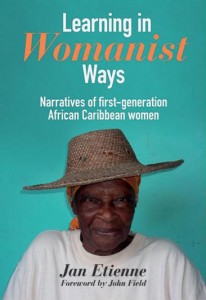This post has been contributed by Dr Jan Etienne, Associate Lecturer in the Department of Geography, Environment and Development Studies, about her new book, Learning in Womanist Ways: Narratives of First Generation African Caribbean Women
Background and influences for writing this book:
I was a member of Birkbeck’s Centre for Extramural Studies and taught on access programmes delivered at community education centres in such diverse multicultural areas as Hackney, Brent, and Haringey.
In my role as access tutor I came across first generation Black African Caribbean women on access courses pursuing learning in their third age (50-75). Whilst delivering courses such as ‘Group Work Skills for the Social Sciences’ I became acutely aware of the unusual rhythmic ways in which older black women in my classes were learning.
Such rhythmic learning styles were steeped in banter, joviality and constant reflections on stories of ‘back home’. I became curious to explore the nature of such learning. How might it play out in the confines of an often rigid higher education establishment?
Things that were happening in the wider environment (community; politics; academia) shaped my understanding and stance towards the issues I discuss in the book.
Their early enthusiasm for lifelong learning and widening participation in the higher education helped to promote second chance learning for older women learning in the community. However, the more recent dismantling of the lifelong learning/continuing education agenda in higher education made me concerned about the future learning opportunities for older black women.
The reduction in funding for adult and community education centres was also a concern as well as the demise of community and voluntary sector services. The closure of these centres/informal learning spaces, frequented by older women made me re-consider the role of higher education in a diverse, ageing society.
The book introduces Matriarchal Learning hubs and acknowledges that in our increasingly ageing society, learning in later years improves lives and has important benefits for all communities – not least to help tackle isolation and loneliness in the community.
However, for older black woman, reduced social capital means fewer social networks and fewer opportunities to access learning. Learning in womanist (black feminist) ways can help improve local communities.
The book reveals that black African Caribbean mothers and grandmothers have a particular interest in learning for the betterment of their communities. In Matriarchal Learning Hubs older black women are able to concern themselves with ways to tackle such issues as support to other black women experiencing the impact of such issues as rising crime on social housing estates; youth violence and school exclusions among Black Caribbean boys. Such issues are key motivations for learning in local community settings. Opportunities to widen learning in community spaces for older people must be a priority.
This book is written for all students who are inspired to make a difference in their local communities. It is also written for those teaching in educational settings with older learners who want to explore alternative teaching strategies. Finally, it is written for policy makers who believe that voluntary and community sector spaces are important necessities in an ageing society.
As a result of my research I am inspired by my ability to enrich my teaching. I have greater understanding of the motivations of my learners particularly those working in the community who are helping to empower and improve he lives of others. I also have a particular new engagement with contemporary narrative study.
Capturing the totality of the nuanced ways in which my research participants shared their experiences challenged me.
Using the variety of flexible approaches to contemporary narrative study provided me with the creative ability to present the women’s narratives in an accessible, appropriate manner.
This book introduces a much needed Black British Womanist perspective to lifelong learning. In an ageing multi-cultural society, learning seeks a Black Womanist (feminist) perspective. This book provides that platform.
